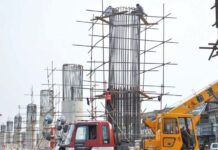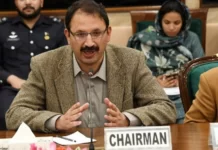As we watch the frenzied power grab in Pakistan, one wonders what exactly are the two sides fighting for. The prize for the winner is a state which has been sliding into disarray for many decades. The weakening of institutions which have been the traditional power centers in Pakistan is not a short-term drift but a longer-term trend that needs to be understood in its proper context.
The political trends are forcing the economy to move rather sluggishly but definitely in parallel with them, towards a de-regularized and more empowered provincial and local arrangement. Though it could be argued that the new-found independent streak of at least 3 of the 4 provinces is actually the cause of these trends. It does not matter.
What matters is that the real fight is between the beneficiaries of the unnatural economic structures which have prevailed for 75 years and those aligned with the more organic evolution of the economy.
Unfortunately, most of our politicians and economic planners along with the business community do not seem to grasp the implications of this change and continue to pander to the status quo.
Those who cling desperately to the past have nothing to offer except wish lists, which amongst others, include; improving governance and rule of law, exporting more than importing and producing and consuming local goods, and institutionalizing democracy from grass root levels.
Achievements in these areas are not wrong to wish for and no one can disagree with them. However, they are used merely as political slogans without any deep analysis or firm footing, or even a basic understanding of how such wishes can come true.
For example, the emphasis on increasing exports without global competitiveness in the manufacturing sector can only imply more rent-seeking for export growth – a formula well-known and practiced for the last 75 years.
It is difficult to see any meaningful change as long as the economic planning, or lack thereof, is driven by the central powers in Islamabad or even through the four provincial capitals. This is what politicians, economic managers, and businesses must come to grips with.
Neighborhood models
There are examples of how development has happened in our own neighborhood. Both China and India have made large strides toward economic development and have followed the bottom-up model of growth from the grassroots level.
In China, the CCP (China Communist Party) government has played a big role in directly supporting state and commune-level growth. In the case of India, the provinces have exercised much more independence in designing the processes for local improvements according to their own needs.
Surely, China has had much more success and has been a case for the world to study while it is widely recognized that India is not in the same league – yet.
The case of China
We have much to learn from China. While we claim the country to be our truest friend, I am not sure how many of us understand that the transformation of the Chinese economy was based on the development of different geographical regions and the local communes within those regions.
Johns Hopkins professor Yuen Ang’s book “How China Escaped the Poverty Trap” is a fascinating read and helps to truly uncover the underpinnings of China’s transformation.
According to Ms. Ang, beginning in 1978, Dao Xiaoping’s reforms were based on the realization that solutions to China’s unique complexities cannot be found by following any particular formula proposed by international donors, modeling itself on other countries, and certainly not by following its own historical evolution. The solutions found were completely indigenous and rooted in simplicity.
To start with, China did not create new institutions or bureaucratic structures. Instead, it used the existing weak ones and incentivized the same to improve performance in various aspects. Attracting investment which was desperately needed to build industry and employment within local communes, became the top priority for the commune bureaucracy.
The reforms were incrementally designed to bring gradual change instead of seeking radical new solutions. Bureaucratic incentives were aligned with efficiency at the local level and additional investment was provided to the communes from the efficiency gains.
Performance was rewarded with promotions, and many of the current CCP leadership, including Xi Jinping himself, belong to the ranks of the bureaucracy which performed first at the local commune level.
This led to a positive loop; first harnessing weak institutions to build markets, these developing markets stimulated stronger institutions, which worked to preserve and strengthen markets further.
Undoubtedly, the growth achieved from this formula suffered from many inadequacies; it was uneven in several aspects; First, geographically, some areas such as the coastal belts of Shanghai and Shenzhen, sped far ahead of the others and the laggard central and western parts had to play catch-up.
Second, and perhaps more importantly, it provided for wealth creation at the cost of escalating inequality as it relied on a pure capitalist model with privatization at the heart of economic reforms.
Third, corruption was rampant but accepted as a necessary price for growth – this is a critical issue that Pakistanis need to digest, and I will come back to it shortly.
Lessons for Pakistan
For the land of the pure, its politicians, and economic managers, there are important lessons to be learned from the above. Could a possible way out of our current malaise be found by restructuring society – by devolving political and economic power to the local level?
In trying to answer this, we must assess our own particular complexities and find indigenous solutions wherever possible. Unlike China before Deng Xiaoping’s reforms, thanks to the British Raj, we inherited a well-organized military and a bureaucratic and judicial set-up that was already used to implementing administrative agendas. We proceeded eventually to build a parliamentary process and were able to have a constitution after several stop-starts.
However, the dismal performance of all state institutions since the country’s inception raises doubt over their utility. Did we actually end up trying to develop first-world institutions in a third-world economy? Is this mismatch one of the significant underlying reasons for economic underperformance? Is corruption a necessary cost to be paid to achieve our growth objectives?
There are no easy answers to these questions. We cannot possibly undo the institutions in whatever shape and form they exist today. But we can try to imagine a different role, a new perspective on their worth to society.
The issue of corruption needs to be addressed not by condoning it but perhaps by creating an incentive structure that provides financial motivation. Clearly jail terms and plea bargains do not seem to be an apt response to this growing menace.
Pakistan’s move towards local empowerment
On the positive side and in line with this analysis, the 18th constitutional amendment was a step in the right direction as it reinforced natural evolution. However, its implementation has left much to be desired even by the political parties who initiated this important legislation.
That said, much that has transpired in the political economy since the passing of this amendment can be seen as the tussle between the forces which would like to see it undone and revert to the old ways of centralized control and those who believe that this legislation is a critical achievement and the country needs to stay on this path – both in terms of legislation and having the will to implement the changes at the grassroots level.
When our politicians speak of transforming Pakistan, they mostly refer to how and why things are done in Islamabad, or at most, the four provincial capitals. This is far from the realities of local communities.
I wonder how someone in South Punjab or rural Balochistan or FATA can ever relate to the political shenanigans on display on the idiot box. It must all seem so irrelevant.
Unless communities are able to see themselves and their families and friends benefiting from public goods and services, we will not see real transformation.
To illustrate what could such transformation look like, here are some of the areas which could benefit from local empowerment;
Provinces to document the economy
Estimates of the size of Pakistan’s undocumented economy vary from 30% to even double the size of the official GDP. Irrespective of this, the parallel economy needs to be documented and brought into the formal sector. Provincial and local governments are in a much better position to achieve this with local know-how and proximity to markets.
Localize Tax Collection
We are already seeing provincial tax collection agencies performing much better than FBR. Our dismal tax-to-GDP ratio can only improve if citizens are able to see the impact of their tax payments. Allowing the local governments to collect taxes to cater to the infrastructure and social sector needs of their communities can improve revenue generation which can then be used for further investments.
Shift Public utilities to provinces and eventually local governments
The control of electricity, water, and gas utilities should be moved to provincial governments initially but ultimately it should rest with local governments. The centrally controlled utilities should be broken up and control of much smaller entities catering to local needs should be transferred. Privatization of public utilities with monopoly rights serves no purpose other than parking public sector subsidies under a different head.
Allow local leadership to rise through the ranks
As a student of management & leadership, I believe this to be a significant advantage of empowerment at the grassroots. Imagine, as a replacement for the current lot, political leaders who have proven themselves on the reform agenda at the local level.
These are only a few examples but I am sure we will find plenty more by thinking along these lines.
In my consulting work, I often advise companies to think outside the box and look for solutions where they currently see no possibilities. It is a process of making people see for themselves that solutions do exist but you have to find them by flipping the script so to speak. This is what Pakistan needs to do to rescue itself from its precarious condition.
I am not sure if China or any other model provides the correct example to be followed by Pakistan, but it is definitely the kind of thinking required to move forward.
























Excellent analysis with simple clear concepts around localised meaningful and practical change.
Effective devolution of power and administrative authority backed by steps towards financial autonomy is the need of the hour. If done with sincerity and devised under a practical roadmap, it has enormous power to galvanise the moribund Pakistan economy. Good emphasis on building on what we have and incrementally build on and improve our governance with an agreed blueprint.
Documenting and bringing the undocumented or parallel economy into the formal sector is indeed an important objective for many countries, including Pakistan.
Among the many key goals of many nations, including Pakistan, is the formalization and documentation of the informal or parallel economy.
We must sometimes take counter action, or perform the opposite of what you would normally do. “Flipping the script” indicates exactly that…performing anything in a different way than it was prescribed, written, outlined, or “as usual.”
Your insight on this topic is truly enlightening. It’s evident that you’ve put a lot of thought into your perspective, and your positive approach is both refreshing and inspiring.